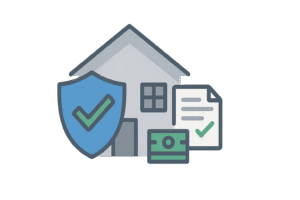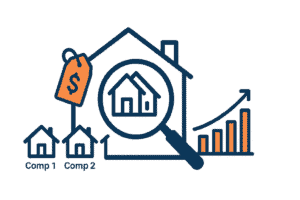How to Save Money on Non-Recurring Closing Costs
The home purchase process can be exciting and nerve-wracking, with numerous costs to consider. First-time home buyers can often feel overwhelmed by the non-recurring closing…

The home purchase process can be exciting and nerve-wracking, with numerous costs to consider.
First-time home buyers can often feel overwhelmed by the non-recurring closing costs and one-time charges that come with the territory. These costs, such as appraisal and attorney fees, may seem daunting, but fear not! There are ways to manage and reduce them effectively.
This blog post will take you on a guided journey through the purchase process. We’ll start with understanding Good Faith Estimates and how to navigate lender fees, bringing you the tools you need to make more informed decisions.
We’ll also dive into various solutions that can help you reduce upfront costs, making homeownership more attainable. You’ll be equipped to save on closing costs and effectively manage your mortgage payments.
So, without further ado, let’s dive into this detailed exploration of the home purchase journey!
What are Non-Recurring Closing Costs?
Non-recurring closing costs, which can catch first-time home buyers by surprise, are one-time fees that arise during a home purchase.
These costs, influenced by purchase price, loan type, and sales price, include appraisal fees, title insurance, agent commission, recording fees, escrow fees, transfer taxes, mortgage insurance, and more.
Mortgage brokers, listing agents, or third parties may introduce these costs. They are called non-recurring because, unlike recurring expenses such as homeowners insurance and monthly mortgage payments, they don’t repeat over the life of the loan.
Understanding how these costs fit into your closing cost mortgage is crucial. Some expenses, like discount points, can lower your mortgage interest rate, while others, like credit report fees and home inspection costs, ensure loan security.
While home buying may seem complicated due to these costs, armed with specific information and legal advice from real estate attorneys, you can navigate them and potentially negotiate some.
These costs can be managed by exploring closing cost loans from institutions like Bank of America, Freddie Mac, or Fannie Mae, reducing upfront costs. Down payment grant programs and negotiations with the seller for a closing cost credit are also options.
With careful planning and negotiation, you can be prepared for the one-time costs when your loan closes.
Reasons You Need to Know About Non-Recurring Closing Costs
Understanding non-recurring closing costs is crucial for several reasons:
- It helps you budget accurately for your home purchase.
- It enables you to negotiate better terms with your lender or seller.
- It allows you to identify unnecessary charges (also known as “junk fees”) and avoid them.
With this valuable knowledge, you are in the optimal position to save money, make well-informed decisions, and navigate smoothly through every step of your real estate transaction.
From negotiating the best deals to understanding the intricacies of the market, you can confidently embark on your journey, equipped with the insights needed to achieve success.
Step-by-Step Instructions to Saving Money on Non-Recurring Closing Costs
To save money on non-recurring closing costs, meticulous planning, and skillful negotiation is crucial while thoroughly exploring various options and comparing rates.
You can effectively identify the best rates and services available, ensuring you secure the most advantageous financial deal possible.
Adopting this comprehensive approach will enable you to maximize your savings and provide you with the peace of mind that comes from knowing you have made a well-informed decision.

Source: consumerfinance.gov
Step 1: Understand Your Loan Estimate
Once you submit your mortgage loan application, your lender must provide a loan estimate within three business days.
This vital document breaks down the costs associated with your home purchase, such as closing costs, loan amount, interest rate, and other fees.
It also estimates your monthly mortgage payment and any prepaid interest or property taxes that need to be paid.
Reviewing the loan estimate is crucial for all home buyers, whether you’re a first-timer or an experienced investor. Understanding the costs and asking your lender or real estate agent for clarification is critical.
Knowledge is power in home-buying, so be proactive, safeguard your personal information, and maintain open communication with your lender.
Step 2: Negotiate Fees with Your Lender.
When purchasing a home, it’s crucial to factor in non-recurring closing costs, such as loan origination and application fees.
The positive aspect of these costs is that they are negotiable. By engaging in a discussion and working with your lender, you can explore ways to lower or eliminate these fees, making the entire home-buying process more manageable.
Loan origination fees are more negotiable than other costs, as they represent a fee the lender charges for arranging a loan. It’s important to note that if your credit score is high and you have a low debt-to-income ratio, you may qualify for preferential treatment on these fees. Asking your lender about this upfront can prevent any surprises at closing.
Application fees, also called processing or underwriting fees, are usually less negotiable than loan origination fees. This is because the cost of staffing and hiring a lender’s staff to process your application comes from this fee. However, if you’re an existing lender customer, you may be able to negotiate a reduced fee or waive it altogether.
The cost of appraisals and title searches are also unavoidable in the loan process.
Appraisals usually have a set fee, and lenders will require one to determine how much your home is worth for the loan amount. Title searches are necessary to check for any issues with the property that could impact your ability to secure a loan.
Both fees should be included in the closing costs estimate so you can rest assured that you won’t face any surprise expenses at the end of the process.
By taking the time to investigate and compare lenders, you may be able to negotiate some or all of your closing costs. It is possible to find lenders willing to waive some fees, such as origination and appraisal fees.
It is also essential to ask if any of the costs can be rolled into your loan amount so you don’t have to pay them upfront.
Ultimately, it will take some research on your part to get the best deal on closing costs.
Step 3: Shop Around for Services
You’ve probably heard the saying, “A penny saved is a penny earned.” Well, this couldn’t be more true when buying a house.
The real estate industry, while exciting, can sometimes feel like navigating a jungle filled with non-recurring costs like appraisal fees, loan origination fees, and title fees.
But here’s a secret – you can save some serious cash by shopping for certain services.
Don’t be shy to ask different providers for their rates. Remember, not all services are created equal, so consider the quality and reputation of the provider, too.
So, what’s the critical thing to remember?
While the journey to homeownership may seem complicated, being an informed buyer can put you in the best position.
Whether negotiating seller’s transaction costs, exploring down payment grant programs, or comparing service rates, each step brings you closer to making your dream home a reality.
Key Considerations For Successfully Saving on Non-Recurring Closing Costs
When navigating the wild seas of homeownership, saving on non-recurring closing costs can be a real lifesaver.
Think of these costs as islands on your journey to your dream home – some are expected, like the appraisal fee and underwriting fee, while others might pop up unexpectedly, like the credit report fee or notary fee.
But don’t worry, with some savvy sailing, you can avoid these financial obstacles.
Did you know you could lower your monthly payment by securing a lower interest rate? Or could setting up an impound account save you months of property taxes? It’s like finding a secret treasure map in a bottle!
So, first-time home buyers don’t feel overwhelmed by this adventure.
Remember, the important thing is to stay informed, ask questions, and never shy away from a good negotiation.
Alternatives to Traditional Financing
Homebuyers have many loan programs to turn their homeownership aspirations into reality. Among these options is the FHA loan program, which offers attractive terms and reduced down payment requirements.
Additionally, down payment grant programs are available to alleviate the initial home purchase costs further.
Embracing these alternative financing options allows potential buyers to make homeownership more affordable and accessible. Thorough research and careful consideration of these programs are crucial to comprehending the available benefits and potentially saving substantial money.
By exploring these options, you have the power to make an informed decision that sets the stage for a brighter future as a homeowner.
Trust me, it’s worth the effort!
Wrapping it up.
Navigating through non-recurring closing costs can initially feel like a complex endeavor. However, with a thoughtful and strategic approach, you have the potential to achieve substantial savings.
By delving into a comprehensive understanding of these costs and meticulously exploring all available alternatives, I witnessed a remarkable reduction in my closing costs while purchasing my personal home and many of the informed borrowers whose loans I have closed in my practice as a real estate closing attorney.
To assist you in your house-hunting journey, I sincerely hope that this post provides you with valuable insights.
Remember these factors as you embark on this exciting endeavor, and may your homeownership journey be embellished with financial prudence and success!





